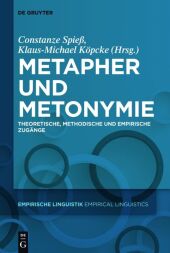 Neuerscheinungen 2015Stand: 2020-02-01 |
Schnellsuche
ISBN/Stichwort/Autor
|
Herderstraße 10
10625 Berlin
Tel.: 030 315 714 16
Fax 030 315 714 14
info@buchspektrum.de |

Klaus-Michael Köpcke, Constanze Spieß
(Beteiligte)
Metapher und Metonymie
Theoretische, methodische und empirische Zugänge
Herausgegeben von Spieß, Constanze; Köpcke, Klaus-Michael
2015. VIII, 408 S. 16 b/w ill. 230 mm
Verlag/Jahr: DE GRUYTER 2015
ISBN: 3-11-037498-6 (3110374986)
Neue ISBN: 978-3-11-037498-8 (9783110374988)
Preis und Lieferzeit: Bitte klicken
Die empirische, auf qualitative oder quantitative Korpusanalyse gestützte Beschreibung von geschriebener und gesprochener Sprache hat sich in der Sprachwissenschaft als zentrales Paradigma etabliert.Die Reihe bietet eine Plattform für synchron-linguistische Ansätze und interdisziplinäre Arbeiten mit linguistischem Schwerpunkt, die innovative Wege empirischen Arbeitens aufzeigen und neue Methoden und Modelle anhand von Datenmaterial entwickeln.
Metaphern und Metonymien sind Phänomene, die unser Denken, Sprechen und Handeln bestimmen und sich u.a. sprachlich manifestieren.Im Hinblick auf die Analyse von Metaphern und Metonymien sind gegenwärtig Tendenzen zu beobachten, die die Phänomene nicht mehr ausschließlich aus kognitiver Perspektive betrachten, da eine ausschließlich kognitive Beschreibung von Metaphern und Metonymien zu kurz greift. Stattdessen werden integrative und interdisziplinäre Ansätze verfolgt, die empirisch orientiert sind und neben kognitiven vor allem soziopragmatische, historische oder sprachvergleichende Aspekte in die Analyse integrieren. Der Sammelband greift diese aktuellen Tendenzen auf. Auf der Basis empirischer Untersuchungen von Metaphern und Metonymien sowohl aus einzelsprachlicher, sprachvergleichender und interdisziplinärer Perspektive werden in den einzelnen Beiträgen theoretische und methodische Fragestellungen diskutiert sowie neue Perspektiven der Forschung eröffnet.
Empirical approaches based on qualitative or quantitative methods of corpus linguistics have become a central paradigm within linguistics. The series takes account of this fact and provides a platform for approaches within synchronous linguistics as well as interdisciplinary works with a linguistic focus which devise new ways of working empirically and develop new data-based methods and theoretical models for empirical linguistic analyses.
This series takes account of the fact that empirical approaches based on qualitative or quantitative methods of corpus linguistics have become a central paradigm within linguistics. Usage-based approaches can be found on all linguistic levels, ranging from phonological and prosodic studies to those in the fields of morphology, syntax, semantics and pragmatics (the latter is especially prolific with, for example, discourse analysis, text linguistics or conversation analysis) as well as sociolinguistics and the analysis of media and computer-mediated communication. The series intends to offer a thematically open platform for different approaches within synchronous linguistics as well as for interdisciplinary works with a linguistic focus which devise new ways of working empirically and which intend to develop new data-based methods and theoretical models for empirical linguistic analyses.Both monographs and edited volumes with a synchronous empirical approach are published. The publication language is either German or English. All submissions are peer-reviewed. External Reviewers:Michael Beißwenger (Duisburg-Essen, Germany),Noah Bubenhofer (Dresden, Germany),Ulla Fix (Leipzig, Germany),Jörg Hagemann (Freiburg, Germany),Mathilde Hennig (Gießen, Germany),Katharina König (Münster, Germany),Konstanze Marx (Mannheim, Germany),Marcus Müller (Darmstadt, Germany),Thomas Niehr (Aachen, Germany),Hannes Scheutz (Innsbruck, Austria)Anja Stukenbrock (Lausanne, Switzerland),Evelyn Ziegler (Duisburg-Essen, Germany),Alexander Ziem (Düsseldorf, Germany). Open Access:Thanks to a pilot project with the FID Linguistik, six upcoming volumes will be published in gold open acceess between 2019 and 2021. All volumes already published have been tranformed to open access publications.https://www.linguistik.de/


